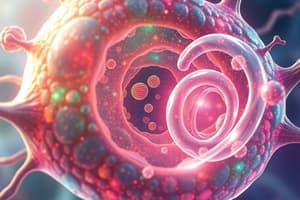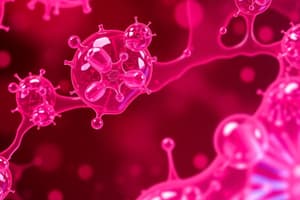Podcast
Questions and Answers
What is considered the basic unit of life according to cell theory?
What is considered the basic unit of life according to cell theory?
- Atoms
- Organelles
- Tissues
- Cells (correct)
Which of the following statements is consistent with the cell theory?
Which of the following statements is consistent with the cell theory?
- Viruses are considered living organisms in the context of cell theory.
- Cells can spontaneously generate from non-cellular materials.
- Disease can occur in cells that are identical.
- All living things consist of one or more cells. (correct)
What component is not found in prokaryotic cells?
What component is not found in prokaryotic cells?
- Cell wall
- Ribosomes
- Plasma membrane
- Nucleus (correct)
Which scientist first observed living cells?
Which scientist first observed living cells?
What structure provides protection and maintains the shape in prokaryotic cells?
What structure provides protection and maintains the shape in prokaryotic cells?
What did Robert Hooke observe in cork that led him to coin the term 'cell'?
What did Robert Hooke observe in cork that led him to coin the term 'cell'?
What is the primary function of a capsule in prokaryotic cells?
What is the primary function of a capsule in prokaryotic cells?
Which of the following is NOT a characteristic of prokaryotic cells?
Which of the following is NOT a characteristic of prokaryotic cells?
What is the function of the Golgi apparatus in a cell?
What is the function of the Golgi apparatus in a cell?
Which component of a plant cell wall is primarily composed of carbohydrates?
Which component of a plant cell wall is primarily composed of carbohydrates?
What role do lysosomes play in cellular function?
What role do lysosomes play in cellular function?
What function do peroxisomes serve within a cell?
What function do peroxisomes serve within a cell?
How does the plasma membrane function as a selective barrier?
How does the plasma membrane function as a selective barrier?
Which of the following accurately describes the cytoplasm?
Which of the following accurately describes the cytoplasm?
What is the primary role of secretory vesicles?
What is the primary role of secretory vesicles?
Which structures appear during cell division and assist in pulling apart chromosome pairs?
Which structures appear during cell division and assist in pulling apart chromosome pairs?
What is the primary function of nuclear pores?
What is the primary function of nuclear pores?
Which statement accurately describes the mitochondria?
Which statement accurately describes the mitochondria?
What is the role of the rough endoplasmic reticulum (ER)?
What is the role of the rough endoplasmic reticulum (ER)?
Chloroplasts are essential for which biological process?
Chloroplasts are essential for which biological process?
What characterizes the smooth endoplasmic reticulum?
What characterizes the smooth endoplasmic reticulum?
Which of the following statements is true about chromatin?
Which of the following statements is true about chromatin?
What is the main function of ribosomes?
What is the main function of ribosomes?
What is the primary function of the cytoskeleton?
What is the primary function of the cytoskeleton?
What is the primary function of plasmids in bacteria?
What is the primary function of plasmids in bacteria?
Which of the following characteristics distinguishes gram-positive bacteria from gram-negative bacteria?
Which of the following characteristics distinguishes gram-positive bacteria from gram-negative bacteria?
What is the appearance of gram-positive bacteria after staining?
What is the appearance of gram-positive bacteria after staining?
What is contained within the cytoplasm of a bacterial cell?
What is contained within the cytoplasm of a bacterial cell?
Which component is responsible for maintaining the shape of eukaryotic cells?
Which component is responsible for maintaining the shape of eukaryotic cells?
What type of DNA structure does plasmid consist of?
What type of DNA structure does plasmid consist of?
What is the main function of ribosomes in cells?
What is the main function of ribosomes in cells?
Which structure is NOT a characteristic of eukaryotic cells?
Which structure is NOT a characteristic of eukaryotic cells?
What is the term used for the type of cell that has a true nucleus and membrane-bound organelles?
What is the term used for the type of cell that has a true nucleus and membrane-bound organelles?
Which term describes the type of cell division that occurs in sex cells?
Which term describes the type of cell division that occurs in sex cells?
What differentiates the Rough ER from the Smooth ER?
What differentiates the Rough ER from the Smooth ER?
How many parts is Interphase divided into?
How many parts is Interphase divided into?
What role does Maturation-Promoting Factor play in the cell cycle?
What role does Maturation-Promoting Factor play in the cell cycle?
Which cell part is present in plant cells but not in animal cells?
Which cell part is present in plant cells but not in animal cells?
What is the primary function of the Smooth ER?
What is the primary function of the Smooth ER?
Which of the following is NOT a function of the Rough ER?
Which of the following is NOT a function of the Rough ER?
Flashcards are hidden until you start studying
Study Notes
Postulates of Cell Theory
- Cells are the basic unit of life and the building blocks of all living organisms.
- All living organisms are composed of cells, and diseased cells originate from healthy ones.
- All cells arise from pre-existing cells through division.
Timeline of Cell Theory
- 1665: Robert Hooke observes cells in a cork slice and names them “cells” based on a honeycomb-like structure.
- 1670: Anton van Leeuwenhoek observes living cells in pond water using a microscope.
Prokaryotic Cells
- Lack a nucleus and membrane-bound organelles, simpler in structure.
- Have components including:
- Capsule: Gelatinous outer covering for protection and adherence to surfaces.
- Cell Wall: Provides protection and maintains cell shape, composed of peptidoglycan.
- Plasmid: Circular DNA molecule that can provide antibiotic resistance.
- Cytoplasm: Jelly-like substance containing water, enzymes, and organelles for metabolic processes.
- Ribosomes: Sites for protein synthesis, composed of RNA and proteins.
Gram Staining
- A technique that differentiates bacteria:
- Gram-positive: Retains purple dye due to thick peptidoglycan layer.
- Gram-negative: Appears red/pink after staining due to a thinner peptidoglycan layer surrounded by an outer membrane.
Eukaryotic Cells
- More complex; contain a nucleus and membrane-bound organelles.
- Components include:
- Nucleus: Houses genetic material and regulates cell activities.
- Mitochondria: Generates ATP through cellular respiration; has inner folds called cristae.
- Chloroplasts: Contain chlorophyll for photosynthesis in plants.
- Endoplasmic Reticulum (ER):
- Rough ER: Studded with ribosomes; involved in protein synthesis.
- Smooth ER: Lacks ribosomes; synthesizes lipids and detoxifies toxins.
- Golgi Apparatus: Modifies, sorts, and packages molecules for transport.
Plant vs. Animal Cells
- Plant Cells: Have a cell wall made of cellulose, large central vacuoles for storage and maintenance of turgor pressure.
- Animal Cells: No cell wall; contain centrioles that assist during cell division.
- Both contain lysosomes for digestion and peroxisomes for fatty acid breakdown.
Cell Division and Cycle
- Mitosis: Process of cell division creating identical daughter cells.
- Meiosis: Involves two rounds of division producing unique sex cells.
- Cytokinesis: Final stage of cell division, splitting the cell into two.
- Interphase consists of three stages: G1, S (DNA synthesis), and G2 phase.
Key Cell Cycle Regulators
- Maturation-Promoting Factor (MPF): Activates cyclin-dependent kinases (CDKs) to initiate mitosis.
- MPF provides checkpoints by either promoting or stopping the cell cycle based on conditions such as DNA integrity.
Summary
- Understanding cell structures and functions is foundational in biology as it delves into the mechanics of life at the microscopic level.
- Familiarity with differences between prokaryotic and eukaryotic cells enhances comprehension of diverse life forms and their complexities.
Studying That Suits You
Use AI to generate personalized quizzes and flashcards to suit your learning preferences.




